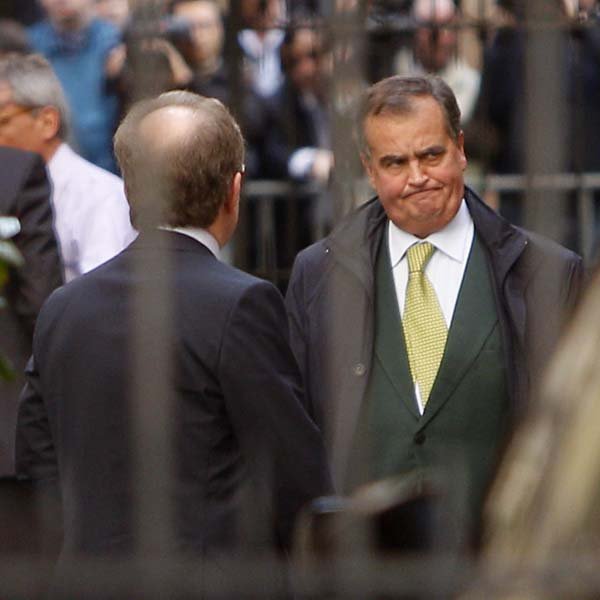BRUSSELS, Belgium — A plan to resolve Europe’s escalating debt crisis was in doubt Tuesday after officials said key parts of the package may not be ready in time for a leaders’ summit today.
A meeting of European Union finance ministers, which was to be held just before the summit, was canceled. A summit of European Union and eurozone leaders planned for this evening will still be held, but it was unclear whether the heads of state and government would be able to reach a detailed deal.
The euro and stocks on both sides of the Atlantic slid on the news over fears that Europe would prove unable, after two years, to get a grip on its debt crisis.
U.S. stocks dropped about 2 percent Tuesday, arresting a three-day rise for the Dow and S&P 500 indexes. The Dow Jones industrial average closed down 207 points, or 1.7 percent, at 11,706.62. The S&P 500 dropped 25.14 points, or 2 percent, to 1,229.05.
The 17 eurozone countries have not reached final agreement on the details of two key elements of the plan - reducing Greece’s huge debts and increasing the firepower of the bailout fund, two European officials said. They spoke on condition of anonymity because the talks were confidential.
Because of that, the 10 European Union countries that do not use the euro won’t sign off on a plan to force banks across the continent to raise billions in capital and insisted that the meeting of finance ministers be called off, the officials said.
One of the officials said that eurozone leaders were also waiting for Italy to take concrete action to control its debts and kick-start growth.
A third European official said he still expected leaders to reach concrete deals, including figures on how much of a cut private investors will have to take on their Greek bond holdings and how much capacity the bailout fund could get through leveraging. The third official was also speaking on condition of anonymity.
The eurozone is negotiating with banks and big investment funds to have them take losses of as much as 60 percent on their Greek bond holdings, but negotiators for the banks have indicated they will not accept losses of that magnitude.
Forcing losses onto banks could trigger big payouts of credit insurance and cause turbulence in global markets, analysts warn.
At the same time, two schemes to give the $612 billion European Financial Stability Facility more capability - by using that bailout fund to guarantee bond issues from shaky countries such as Italy and Spain - also still lack detail.
Some policymakers have doubts how effective the changes to the bailout fund will be at containing the crisis, and Guy Verhofstadt, the leader of the liberal faction in the European Parliament, warned that current ideas to give the European Financial Stability Facility more leverage could fail to convince the markets.
But even if the technical difficulties of increasing the size of the bailout fund can be worked out, rich eurozone countries remain reluctant to commit their money to insuring the debt of Italy until that country does its part to get its economy back on track.
Italian Prime Minister Silvio Berlusconi has promised his eurozone colleagues to detail concrete measures his government plans to take to enhance growth and reduce its debt in time for today’s summit.
Berlusconi has been unable to get his key ally in Parliament, the Northern League, to swallow an increase in thepension age. The Northern League says it will alienate its constituency of workers in the productive north.
Northern League leader Umberto Bossi conceded the government is at risk.
“Let’s say the situation is difficult, very dangerous,” he said in Rome.
Berlusconi’s heir apparent, Justice Minister Angelino Alfano, suggested Berlusconi’s party had reached a deal with the Northern League - but no details were announced and the premier’s office remained silent.
“We hope to have identified a point of balance with the League that allows us to give a response to the European Union also on pensions,” Alfano said during the taping of an evening talk show, the news agency ANSA reported.
The European Union wants Italy to raise its standard pension age from 65 to 67, change the legal system to encourage investment, and pass other changes to improve growth. All are measures that have been talked about for years in successive governments, but there has been little political will to see the unpopular decisions through.
U.S. Treasury Secretary Timothy Geithner said Tuesday that European leaders should “deliver on the commitments they’ve made” for a rescue from the euro-area debt crisis.
“They’re saying a lot of the right things and they’re clearly working on it and they’re moving with a greater sense of urgency,” Geithner said at a news conference in Wilmington, N.C. “That’s all welcome, but until we see what they come together with, it’s a little hard to evaluate.”
Assistant Treasury Secretary Charles Collyns told U.S. lawmakers that the administration is confident in the commitment of European leaders and sees a “very strong likelihood that Europeans will achieve success.” Information for this article was contributed by Gabriele Steinhauser, Coleen Barry and Eugenio Montesano of The Associated Press; by Cheyenne Hopkins and Ian Katz of Bloomberg News; and by Kate Gibson of MarketWatch.
Front Section, Pages 1 on 10/26/2011
